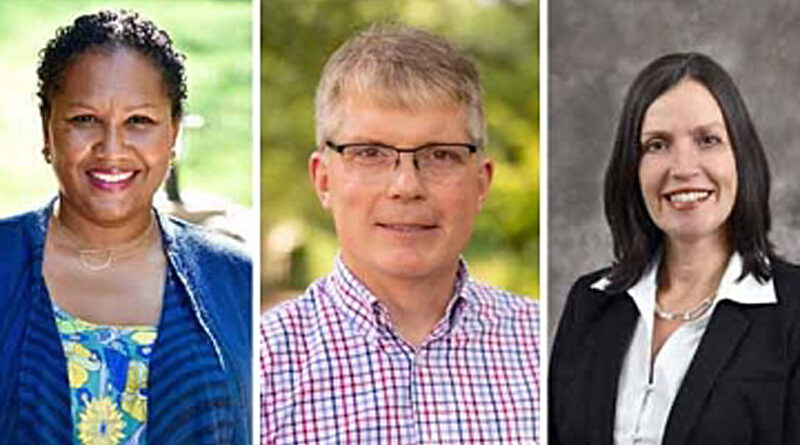And This Year’s Charlotte University Marshalls Are …
University marshal is an honor UNC Charlotte bestows on distinguished faculty members. They represent the faculty at ceremonial functions of the University, including commencement, and serve as symbols of faculty excellence and leadership in teaching, professional achievement and service to campus and community. Congratulations to this year’s University marshals Deborah Beete, M. Lyn Exum and Linda Shanock.
Deborah Beete, public health sciences
Beete is a lifelong learner who meets students where they are and pushes them to exceed their own expectations. A former practitioner in public health, Beete now uses her past knowledge and experiences to foster and encourage the next generations of academics and practitioners in the field.
Not only a profound academic, Beete is an advocate for anyone with differences. She has a devotion to making sure her classes, her department and the University are accessible for all students, and that diversity, equity, inclusion and belonging are integral aspects of student experiences.
“The aim of every course I teach is to nourish my students’ personal, academic and professional growth,” said Beete. “I approach my teaching with the assumption that all students have the capacity to be successful. My goal is to provide a safe and healthy learning environment where they can develop into successful students and active and responsible citizens.”
M. Lyn Exum, criminal justice and criminology
Exum has a reputation for engaging students and using unique teaching methods to encourage student learning. Known for his contagious enthusiasm when teaching and his ability to relate to his students, Exum is a one-of-a-kind educator who shapes students into their best critical-thinking selves.
Exum’s teaching philosophy, which stems from past educators in his life, includes enforcing student accountability while being attentive and meeting them where they are at that moment. He strives to be approachable, enthusiastic and an available resource and mentor.
“I believe that by showing my students that I find the course material to be exciting and interesting, they will become more engaged and invested in learning it,” said Exum. “I continuously search for ways to make complex ideas easier to understand. By making the big picture easier to grasp, students become more willing to dive into the smaller, more subtle nuances — allowing me to teach simply, while students learn deeply.”
Linda Shanock, psychological science
Shanock strives to create a supportive learning environment so that students of all backgrounds and ability levels feel they can voice their views, make contributions to class discussions and grow in their confidence with the material.
In her role as program director for the master’s program in industrial/organizational psychology and in her previous role as associate director of the interdisciplinary Organizational Science program, Shanock has engaged in numerous one-on-one mentoring activities with students.
“To be a successful educator, teaching and mentoring must permeate all three areas of our job as faculty members — scholarship, teaching and service. I believe in being a role model for our students in all aspects of my job. Doing so helps students know what it looks like to be a professional, successful, caring professor and mentor.”
MORE >>>

